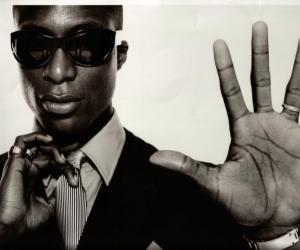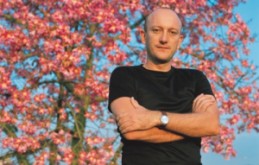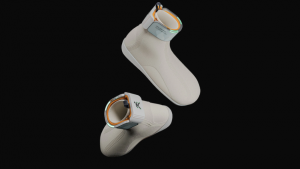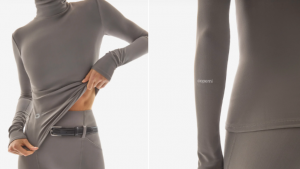First Published in
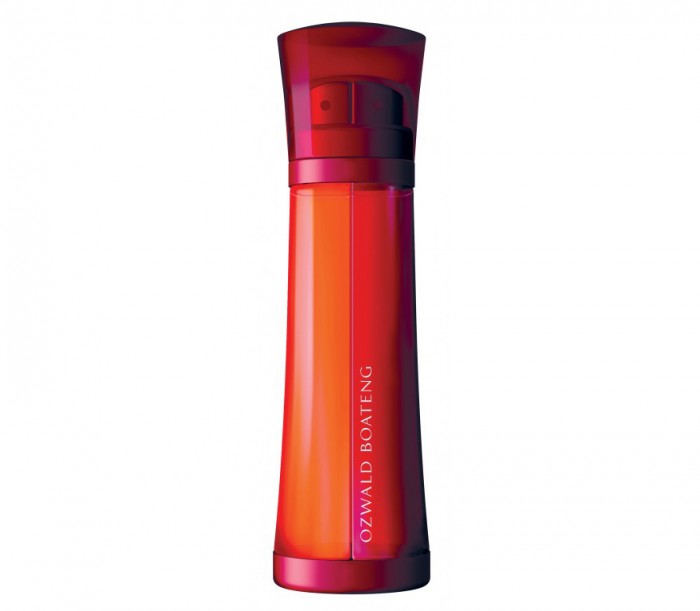
Ozwald Boateng, the first African tailor to design much sought after bespoke suits dresses some of the world's most stylish men such as Billy Zane, Anthony Hopkins, George Michael, Samuel L. Jackson and Will Smith to name a few. But this is not what truly impressed all those who saw him speak recently at the 6th Design Indaba in South Africa. For some it was his regal confidence.
For Sean O'Toole, however, it was the earnest passion he evidenced while talking about his craft. And also the way he effortlessly combines his Ghanaian ancestry with a quintessentially British worldview.
How do you remember your youth?
I remember the 1970s very well. Growing up in the seventies, London was a very different place compared to what it is today. London was faced with several racial issues causing friction between different cultures. Where I used to live in north London, near Crouch End, Muswell Hill, there weren't many black families living around there. Black people were always in the minority. I just took it as the norm and I had no issues with it.
When I was at school I was in the minority. I used to get picked on; people spat on me and called me all kind of names. But my father taught me from a very early age not to have issues with colour. Despite the issues people had against me because of my colour, I never let it affect me. It was simply a case of people liking or disliking you.
How did these experiences translate when you decided to become a tailor?
I didn't want to do what my parents were doing; we all wanted to better ourselves. We wanted a voice. But there were issues with that too. During that time of getting a voice some people had an attitude of entitlement, of deserving to get what they wanted without doing the work. There was another school of thought that believed you had to do the work to get the voice. By the time I set up my space on Portobello Road, my mindset was very much of the latter school of thought, that you had to do the work. At that point I had already done quite a lot of work. I was already reasonably well known.
Living in Portobello Road was fantastic. It is a real melting of cultures, people from different cultural backgrounds living in the same area. It was great place for me start my business because no one had any issues; it was all about doing good, creating the best that you can create.
In terms of your home life, how much of your original Ghanaian identity did your parents choose to keep and make a part of your home life?
They kept it completely. My cultural background is what it is because of that. I have never shied away from it either; I embraced it. We always spoke our native Ghanaian language in the house. The culture was fully embraced. The only thing was that we were living in London, so there was no getting away from that aspect of the culture I was living in. So there was this fusion in the house. You have to bear in mind that Ghana was an old British colony, and in fact there were a lot of institutions in Ghana that my father grew up with. So he had that Britishness in him already by the time he got to England. I grew up in a household where this fusion of cultures was just the norm.
Looking back over the past two decades of your career, England has seen a lot of coming together of cultures, particularly amongst the youth. How has this impacted on your career?
First off that sense of coming together has been massive; it's been huge. I remember in the 1970s, the skinhead culture, I had friends who fought the skinheads. That was just part of what life was, it was always about being in a group. In the 1970s it was unusual to see a mixed race kid, now in London it is almost beyond the norm. It's a completely different world. I think the fact that there has been this mixing has made London very unique. There is such an embrace of so many different cultures there.
Do you think what is happening culturally in London has made people more receptive to what you are doing as a fashion designer?
Completely, one hundred percent. It changed perceptions. I was also part of that change in perspectives in terms of what it is to be Black and British. I played a big role in that. But I didn't have a chip on my shoulder. It is so easy to say because I am black I am not achieving. Whenever I didn't get the recognition I believed that I deserved, I didn't make an excuse about it being racial. Eventually I earned my respect because I wasn't shouting out about the fact that I was black and prejudiced. My colour became irrelevant and it became more about the work.
Looking back on your career, has there been defining moment for you, say a moment when you felt you had earned the respect of your peers and also satisfied yourself?
You know what, that was very recently. I did an event on Saville Row last year and I think the fact that I was able to celebrate an achievement of opening my new building on Saville Row was probably a symbol of me saying I've finally got my recognition. But still saying all of that, I think I deserve more, and I think it's coming. That's what it is to be creative; you create with a view that everyone will understand you. When only 60% of the people understand you, you get upset about the 40%. I am still upset I haven't convinced the 40% because I want 100%. I know it will never happen but I still want it. But looking back, Saville Row was definitely a defining moment in my life. It was truly a historical moment. It was the first time ever that Saville Row had been closed for an event of this type - ever. I closed the street from 12 o'clock in the afternoon and invited over a thousand guests. If you know what central London is like, to have achieved that with all the hurdles I had to overcome, I didn't get much support from my neighbours on Saville Row - was an achievement.
Do you think there is still a place for the suit in the 'modern' young wardrobe?
I think the suit has such an important role. The suit is here to stay because it represents so many things. I always make the link between the suit and the suit of armour. It represents so many other things. Maybe the form of what the suit looks like will change but the suit is definitely here to stay.
Would you like to be remembered as a populist or a pioneer?
Pioneer? Yeah, I've broken new ground. Modernist maybe, but you know what, I'd like to be remembered for bringing magic to an area of design that needed it. I think I brought more than just colour to Saville Row. I definitely evolved a whole new approach to cutting and design. I have done a lot more than simply use colours in an innovative way. It would be lovely to be remembered for bringing magic, because bringing magic to people's lives is fantastic.
It's your second visit to South Africa. When was the first?
Five years ago. I came on a holiday in December. I was really blown away, it was really beautiful and I was excited. I have definitely seen changes since the last time I was here. The last time I was here I lost my friends on the beach. I stood on a rock and saw that I was the only black guy on the beach. My friends easily spotted me waving my arms. What I have seen this time is a lot more integration, I see a lot more black people in everyday life, people living lifestyles similar to myself. That is very apparent. I am really excited; I think there is such great opportunity here in South Africa.


